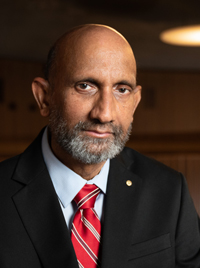
Governments and society in 2023 turned to science for evidence to inform vital decisions we faced. Yet we also saw overall investment in R&D drop to an all-time low. 2023 is the year that science became more valued, but more vulnerable.
The Australian Government looked to the Academy and the Australian scientific community to help it get to grips with the rapid advance of science in domains as varied as artificial intelligence (AI), the future of the Great Barrier Reef, and our regional relationships in the Pacific and Asia. And the justice system looked to the Australian Academy of Science to act as an independent scientific adviser to make sure scientific principles were upheld during the Second Inquiry into the Convictions of Ms Kathleen Folbigg.
Internationally, we convened AI experts across our region to explore how nations are preparing their science systems for the impacts of AI and how preparedness could be measured. The Academy also reconceived the research integrity system in Australia to make it more robust and fit for the modern research enterprise.
We convened experts and published advice on the science required to remove greenhouse gases from the atmosphere, an analysis of Australia’s high-performance computing needs, and the impact of national security measures on international research collaboration – an area of growing importance as trilateral arrangements between the US, UK and Australia develop under the AUKUS agreement.
The Academy commenced its five-year leadership role hosting the International Science Council’s Regional Focal Point for the Asia Pacific and, importantly, assisted in convening Pacific scholars who have agreed to establish a Pacific Academy to ensure they can contribute to and benefit from regional and international decision making.
In 2024, the Academy celebrates its 70th anniversary. Since 1954 there have been 915 Fellows elected for their outstanding contributions to science. Next year we look forward to highlighting their ground-breaking achievements.
The contributions of Fellows have changed the world: think Howard Florey’s discovery of penicillin, to Fiona Stanley identifying that a maternal diet rich in folic acid can prevent spina bifida in babies, to David Solomon creating plastic bank notes.
Many of the Academy’s current Fellows are also at the forefront of technical innovation: think quantum computing (Michelle Simmons), recycling (Veena Sahajwalla) and clean energy (Rose Amal).
In 2024, it is our goal to have the Australian Government develop a cross portfolio and cross sectoral 10-year investment plan that reverses the decline in R&D investment and sees government, the higher education sector and industry take a cohesive and strategic approach to R&D that achieves multi-partisan support.
The Academy will develop a Decadal Plan for Science to show how today’s discovery is tomorrow’s prosperity. It will outline the conditions necessary for the science community to enable Australia to meet its ambitions to be healthy, prosperous and secure in a sustainable environment, and to face the multiple challenges before it.
We also want policy makers and governments to intensify their use of expertise to inform decision making. Science should be heard wherever and whenever decisions are made – in our parliaments, boardrooms, courts of law and in the public square.
In 2024, science must be brought to the service of the nation to accelerate the reconfiguration of our economy, so it is fuelled by industries that are circular, not consumptive. And we need to create knowledge in a transdisciplinary and inclusive way.
Our knowledge systems must evolve to embrace Indigenous knowledge and to adapt to the community’s varying capacity to respond to scientific and technological advances. When we disenfranchise communities, we all suffer and we risk eroding trust in the very knowledge we need to live within planetary boundaries.
Professor Chennupati Jagadish AC PresAA FREng FTSE
President, Australian Academy of Science
This article was first published in Cosmos Magazine.
© 2026 Australian Academy of Science